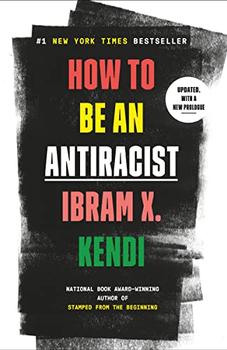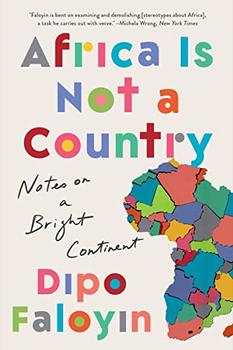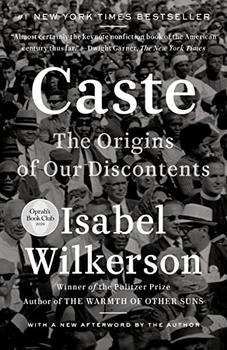Summary | Excerpt | Reviews | Beyond the book | Read-Alikes | Genres & Themes | Author Bio

Ibram X. Kendi opens How to Be an Antiracist with a personal story he finds shameful in retrospect, recalling his participation in a high school oratorical contest named for Dr. Martin Luther King Jr. In his speech, Kendi excoriated Black youth for a higher rate of teen pregnancy and for valuing sports and music over schoolwork. "Who on earth did I think I was?" he wonders. The point he's making is that to argue that Black people should pull themselves up by the boot straps and improve their lives is to ignore the centuries of oppression and systemic racism that established a white supremacist society where Black people are not afforded anywhere close to the same opportunities as their white peers. Of course their lives and values will be different.
It's an effective hook on more than one level. First, the story is reassuring to the reader because Kendi is demonstrating that everyone can be racist, including the author of a book called How to Be an Antiracist. Second, it segues seamlessly into an explanation of the title:
The opposite of 'racist' isn't 'not-racist.' It is 'anti-racist.' What's the difference? One endorses either the idea of a racial hierarchy as a racist, or racial equality as an antiracist. One either believes problems are rooted in groups of people, as a racist, or locates the roots of problems in power and politics, as an antiracist. One either allows racial inequities to persevere, as a racist, or confronts racial inequities, as an antiracist.
Kendi continues interspersing the personal with the political throughout the text. He recounts the early stages of his parents' relationship and incidents from his own life, and in doing so, he charts the history of racism and Black activism from the 1970s to the present. (He does reference events from earlier centuries, but readers interested in the history of racism would be better off seeking out his previous book, Stamped from the Beginning, for which he won the National Book Award.) He recalls growing up in the New York City borough of Queens and later moving to Manassas, Virginia as a teenager, where he attended a school called Stonewall Jackson High School. In both places, his education was often impeded by white teachers who rarely called on him or the few other Black students in class. This took place in the 1990s and Kendi remembers feeling an intense struggle while vacillating between the dueling cultural messages he absorbed about Black people — "we were either King's disciples or thugs killing King's dreams" — which would later inform his oratorical contest speech.
One of the most significant themes in the book, skillfully considered from multiple angles, is assimilation and respectability politics. In this context, respectability politics refers to the argument by Black leaders, thinkers and others with influence that engaging in irreproachable moral conduct will earn Black people respect and success. Likewise, white assimilationists believe (overtly or subconsciously) that Black people should make every effort to conform to the behavioral standards of white society. Again, neither of these attitudes takes into account the history of racism and how it is woven into the very fabric of American culture and institutions. These are precepts that blame the victim, conveniently ignore centuries of racist crimes and establish impossible expectations — no matter how "respectably" Black people may conduct themselves, they will still never be white and will therefore never be fully accepted into a white supremacist society.
Kendi also refutes some powerful myths, providing data, for instance, demonstrating that unemployment level is a much more likely predictor of a neighborhood's violent crime rate than the skin color of the residents living there. He explains that the achievement gap between majority-white and majority-black schools is the result of the underfunding of the latter, rather than some inherent difference in intelligence or ambition between white and Black students. This and many other discussions in the book explore the intersection between race and class and how, because of the policies of inequity built into the system from slavery to racial income disparities, "To love capitalism is to end up loving racism." An antiracist must be anti-capitalist as well, because both were "birthed together from the same unnatural causes."
In the book's final pages, Kendi recalls his recent battle with Stage 4 metastatic colon cancer, which has an 88 percent fatality rate over a five-year period after diagnosis. After six months of chemotherapy, he underwent surgery to have his tumors removed. An evaluation of his cells indicated he was cancer-free. This serves as an apt metaphor for the urgent need to excise racism from American society. Having essentially experienced a miracle, he expresses an inspiring message of hope: "Racism is not even six hundred years old. It's a cancer that we've caught early."
The author's contextualizing of the impact of systemic racism within his own life story is compelling and persuasive; his personal examples serve as proof of his claims regarding how racism affects Black people, and also invite the reader to conduct self-examination. Kendi demonstrates how antiracism is a lifelong commitment one must actively choose on a daily basis, and also how that choice is not only necessary but richly rewarding.
![]() This review was originally published in The BookBrowse Review in June 2020, and has been updated for the
February 2023 edition.
Click here to go to this issue.
This review was originally published in The BookBrowse Review in June 2020, and has been updated for the
February 2023 edition.
Click here to go to this issue.

If you liked How to Be an Antiracist, try these:

by Dipo Faloyin
Published 2023
An exuberant, opinionated, stereotype-busting portrait of contemporary Africa in all its splendid diversity, by one of its leading new writers.

by Isabel Wilkerson
Published 2023
The Pulitzer Prize–winning, bestselling author of The Warmth of Other Suns examines the unspoken caste system that has shaped America and shows how our lives today are still defined by a hierarchy of human divisions.
The single biggest problem in communication is the illusion that it has taken place
Click Here to find out who said this, as well as discovering other famous literary quotes!
Your guide toexceptional books
BookBrowse seeks out and recommends the best in contemporary fiction and nonfiction—books that not only engage and entertain but also deepen our understanding of ourselves and the world around us.